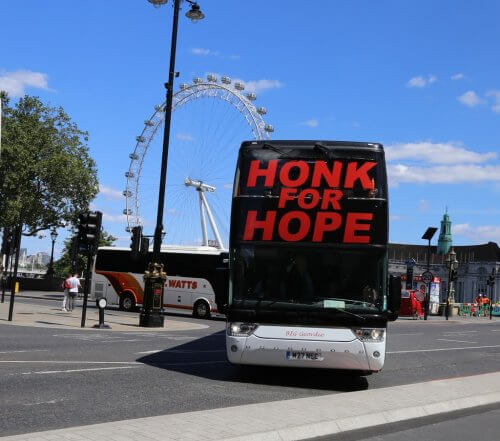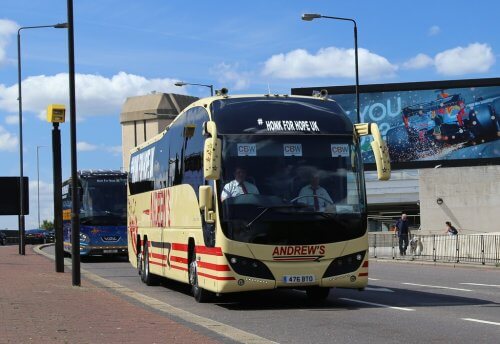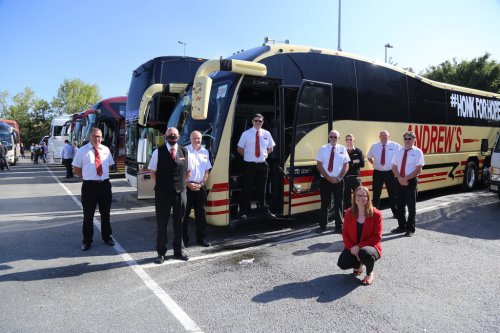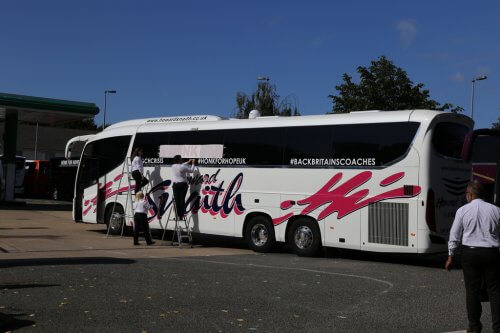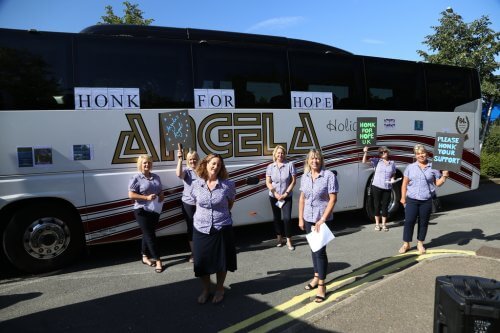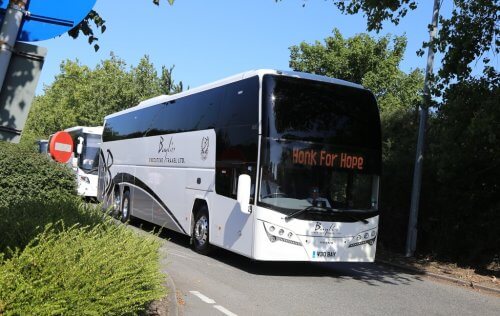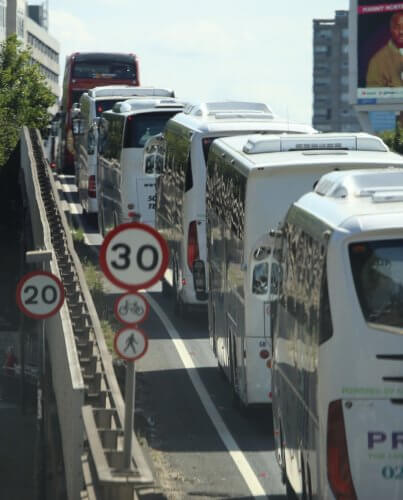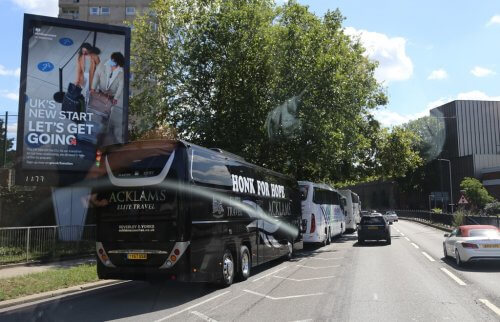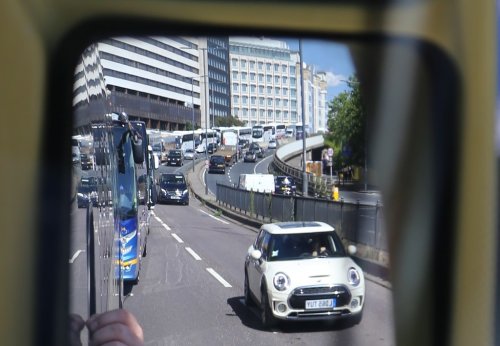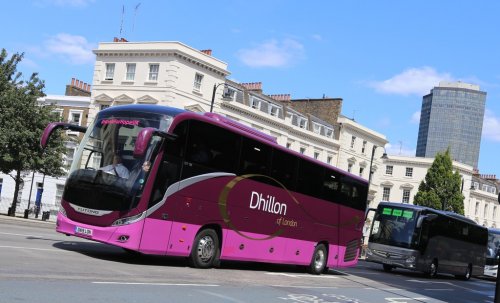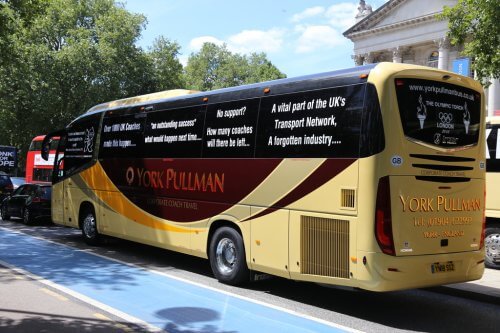On Monday 20 July coaches from across the UK gathered in London to highlight the plight of the coach industry, which has seen its summer season disappear. CBW was there to record the scene and sample the mood of those who took part.
Following earlier events in the north of England organised and spearheaded by Jenna Rush of North East Coach Travel, the coach industry upped it’s game, and with the help of Alan Chown of Dhillon’s of London Honk for Hope took its message to the streets of London. An estimated total of over 400 coaches made their way towards the UK’s capital to call on the government to help out before it is too late, before more companies go the way of well-known tour operator Shearings and close their doors, making staff redundant and leaving assets whose book value has fallen dramatically to be sold.
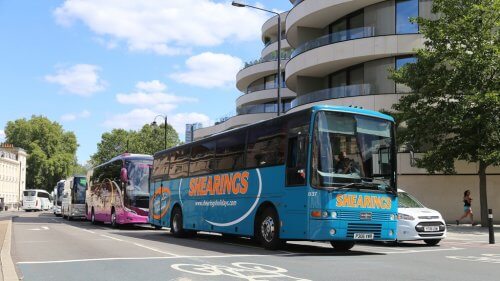
CBW was given the chance to join Andrew’s of Tideswell, who joined the convoy in their immaculate and impressive tri-axle Plaxton Elite. With Russell Andrew at the wheel, and joined by other family members and a small number of drivers, we set off at around 0530hrs from the firms Derbyshire depot, heading initially for Leicester Forest services on the M1, where a number of operators from the region congregated before heading south towards London, including coaches from Paul S. Winson, Slacks, Sharpes, L&B Travel, Johnson Bros. and Redfern Travel. After a short stop and a bacon butty, we were on the road again, and as might be expected the mood was one of both frustration but also optimism. Our route took us down the M1, around the M25 and onto the M4.
On arrival at the muster point at Heston services, a large number of coaches were already present, with room fast running out for later arrivals. The few HGV’s parked in the lorry park quickly found themselves surrounded by coaches, with more arriving all the time, all keen to take their voice to Westminster and help ensure that their concerns were heard. Some operators took the chance to apply vinyls to their coaches, which had been designed and printed at the last minute, such was the speed this event had been organised at Johnson Bros. even brought out a ladder to apply the logo to the roof of their coach, to make sure to get the message across to the Sky News helicopter which was hovering over central London.
Just before 1000hrs, we set off, joining yet more coaches as our message rolled its way towards Westminster, the route taking us into Central London across the Hammersmith flyover and down towards the River Thames at Chelsea, passing the towering Battersea Power Station on the far bank before arriving slowly outside the seat of government. The convoy was headed by a Van-Hool-bodied Volvo B10M carrying period Shearings livery, as a nod to that company’s recent demise as a result of the coronavirus epidemic, and also to symbolise the notion that on the day, the coaches followed Shearings, and over the next few weeks and months, those companies may also follow Shearings into administration.
Aboard our coach, it took us a good while to reach the centre, and reports suggested that the convoy of some 400-plus coaches stretched for around 15 miles. Traffic speeds were low, and many pedestrians and passers by, as well as a number of car passengers and – worryingly – drivers took out their mobile phones to film the scene, all going to add to the success of the day as those clips and images were posted on social media. Many honked or waved to the convoy, and some came for a brief chat to drivers through the window to find out more.
A few took to social media to complain about the noise distracting them from work, or ask how companies which were asking for a bailout could afford the fuel to do this. In reality, a good number of them couldn’t. One operator was reported to have syphoned the remaining diesel from his fleet into one coach to make the trip, only to have it repossessed the day before. Others said that they felt the cost of a tank of fuel, as well as the expenses associated with putting a coach back on the road for a day, such as insurance and inspection, were a necessary expense if it would go towards saving their business and dozens of others like them. They pointed out too, that while hundreds of Pounds might seem a lot, it is small change compared to how much it costs to keep a fleet standing idle, with payments going out and nothing coming in.
The event ran smoothly, although later in the day it was noted that the police were instructing drivers to refrain from using their horns around the Houses of Parliament, following complaints from those within that they were unable to work for the noise, the irony of which was not lost on operators who have been unable to work since March.
Despite best efforts, it did not prove possible to arrange a suitable rendez-vous point for coaches to park in London, where the press and media could gather to listen to operators’ messages, but at the last minute a site near Luton airport for interviews with the BBC and to hear speeches from a number of those who have been affected on how they are, or are not, coping.
Ian Jones of Backhouse Jones, who have been providing ongoing support and advice to the Honk for Hope UK movement, summed it up as ‘a fantastic day.’ He drew comparisons to the Jarrow March, and likened the day to the little ships of Dunkirk, seeing the smaller and independent operators gathering together for the greater good. He said that the coach industry has probably never worked so closely on such a huge scale, and that everyone should give themselves a clap for what has been achieved.
Ian called for three things which are needed to help keep the industry secure: a replacement for the furlough system, which will end long before operators are back to full strength; help with finance, and action to provide security for those operators whose vehicles are secured by personal guarantee and whose homes are at risk.
Although the background to the day was a serious and somewhat depressing one, all of those in attendance agreed that it had been a good day, with agreement from many that it was remarkable to have organised the event in such a short time. One operator, who was faced with losing all he had worked for, thanked Jenna and all those present, for giving him hope in what was a very dark moment for him.
Lee Johnson of Johnson Bros. said that it was as if the taps had been turned off, and although some companies like his had a long history and were in the fortunate position of having some financial grounding to allow them to remain viable, the Government needs to see the effect that is rippling through the industry.
Alexander Ehrlich, Austrian founder of the Honk for Hope movement, took the time to travel to London to be a part of the day, and was also there to address operators in Luton. “It was very important for me to be here,” he told CBW. “I think that the UK gave additional thrust and momentum to the fight for survival. In other countries there was a big ‘hurray’ when we heard that Jenna and Matthew [Forsyth] had organised the Lightwater Valley event.
“Among all the countries, the UK is the best organised. There is not one driver here without a tie, the British coach industry has shown its level of professional standing. We are calling for help, but we don’t want to provoke bad feeling. The people who saw us today are our passengers, it’s not good to make them angry. We need to make them understand we need help.
“For me personally, I think that for tourism across Europe, there have been two crises this year, coronavirus and Brexit. For the coach industry, political borders don’t count. We go everywhere, and we are united.”
It remains to be seen what effect the protestations will have, and the industry is clear that it is not just looking for a handout, but for support to help it stay afloat through the quiet winter season so that it can thrive and play its part in helping the travel and tourist economies grow again once the coronavirus crisis is behind it. Those present in London and Luton agreed that whatever the outcome, there had already been the positive benefit of the industry being able to come together, to put on its best clothes, put coaches on the road and do itself proud, which had already given much needed hope and positivity to those who have seen no work since March.

